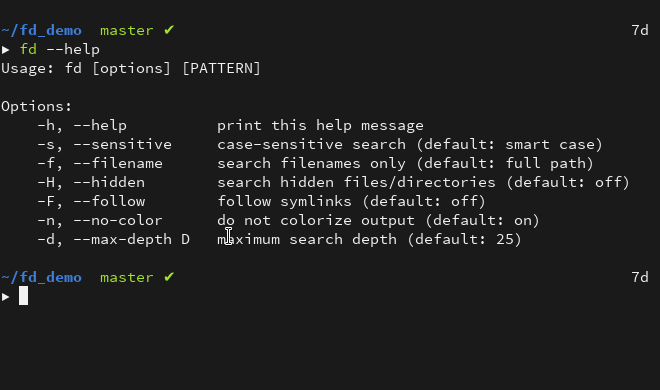mirror of
https://github.com/sharkdp/fd.git
synced 2024-11-18 09:50:34 +01:00
85 lines
3.5 KiB
Markdown
85 lines
3.5 KiB
Markdown
# fd
|
|
[](https://travis-ci.org/sharkdp/fd)
|
|
|
|
*fd* is a simple, fast and user-friendly alternative to
|
|
[*find*](https://www.gnu.org/software/findutils/).
|
|
|
|
While it does not seek to mirror all of *find*'s powerful functionality, it provides sensible
|
|
(opinionated) defaults for [80%](https://en.wikipedia.org/wiki/Pareto_principle) of the use cases.
|
|
|
|
## Features
|
|
* Convenient syntax: `fd PATTERN` instead of `find -iname '*PATTERN*'`.
|
|
* Smart case: the search is case-insensitive by default. It switches to
|
|
case-sensitive if the pattern contains an uppercase
|
|
character[\*](http://vimdoc.sourceforge.net/htmldoc/options.html#'smartcase').
|
|
* Colorized terminal output (similar to *ls*).
|
|
* Ignores hidden directories and files, by default.
|
|
* Ignores patterns from your `.gitignore`, by default.
|
|
* Regular expressions.
|
|
* Unicode-awareness.
|
|
* The command name is *50%* shorter[\*](https://github.com/ggreer/the_silver_searcher) than
|
|
`find` :-).
|
|
|
|
## Demo
|
|
|
|

|
|
|
|
## Colorized output
|
|
`fd` can colorize files by extension, just like `ls`. In order for this to work, the environment
|
|
variable [`LS_COLORS`](https://linux.die.net/man/5/dir_colors) has to be set. Typically, the value
|
|
of this variable is set by the `dircolors` command which provides a convenient configuration format
|
|
to define colors for different file formats.
|
|
On most distributions, `LS_COLORS` should be set already. If you are looking for alternative, more
|
|
complete (and more colorful) variants, see
|
|
[here](https://github.com/seebi/dircolors-solarized) or
|
|
[here](https://github.com/trapd00r/LS_COLORS).
|
|
|
|
## Benchmark
|
|
A search in my home folder with ~150.000 subdirectories and ~1M files. The given options for
|
|
`fd` are needed for a fair comparison (otherwise `fd` is even faster by a factor of 5 because it
|
|
does not have to search hidden and ignored paths):
|
|
```
|
|
benchmarking bench/fd --hidden --no-ignore --full-path '.*[0-9]\.jpg$' ~
|
|
time 2.800 s (2.722 s .. 2.895 s)
|
|
1.000 R² (1.000 R² .. 1.000 R²)
|
|
mean 2.821 s (2.810 s .. 2.831 s)
|
|
std dev 16.52 ms (0.0 s .. 17.02 ms)
|
|
variance introduced by outliers: 19% (moderately inflated)
|
|
|
|
benchmarking bench/find ~ -iregex '.*[0-9]\.jpg$'
|
|
time 5.593 s (5.412 s .. 5.798 s)
|
|
1.000 R² (0.999 R² .. 1.000 R²)
|
|
mean 5.542 s (5.502 s .. 5.567 s)
|
|
std dev 37.32 ms (0.0 s .. 42.77 ms)
|
|
variance introduced by outliers: 19% (moderately inflated)
|
|
```
|
|
(benchmarking tool: [bench](https://github.com/Gabriel439/bench))
|
|
|
|
Both tools found the exact same 14030 files. Note that we have used the `-iregex` option for `find`
|
|
in order for both tools to perform a regular expression search. Both tools are comparably fast if
|
|
`-iname '*[0-9].jpg'` is used for `find`.
|
|
|
|
## Install
|
|
With Rust's package manager [cargo](https://github.com/rust-lang/cargo), you can clone, build and install *fd* with a single command:
|
|
```
|
|
cargo install --git https://github.com/sharkdp/fd
|
|
```
|
|
Note that rust version *1.16.0* or later is required.
|
|
The release page of this repository also includes precompiled binaries for Linux.
|
|
|
|
On **OS X**, you can use [homebrew](https://brew.sh/):
|
|
```
|
|
brew install fd
|
|
```
|
|
|
|
On **Arch Linux**, you can install the AUR package [fd-rs-git](https://aur.archlinux.org/packages/fd-rs-git/) via yaourt, or manually:
|
|
```
|
|
git clone https://aur.archlinux.org/fd-rs-git.git
|
|
cd fd-rs-git
|
|
makepkg -si
|
|
```
|
|
|
|
## Development
|
|
```bash
|
|
cargo build --release
|
|
```
|